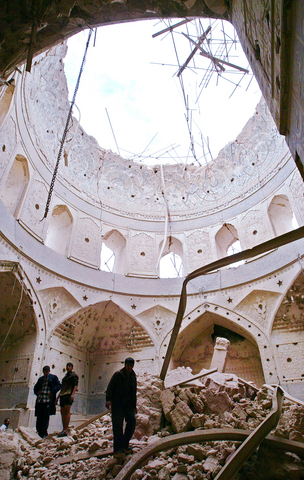Top Shiite leaders were yesterday deciding the fate of Prime Minister Ibrahim Jaafari as sectarian tension loomed large in Iraq after dozens of Shiites died in bombings this week.
Leaders of the Shiite United Iraqi Alliance (UIA), the largest parliamentary bloc in the country, began a meeting to resolve the political impasse involving Jaafari's candidacy as the next premier, a source close to the political negotiations said.
He said the meeting was called after Iraq's revered Shiite cleric Ayatollah Ali al-Sistani wrote a letter to the alliance asking the leaders to keep the alliance united.

PHOTO: AP
Sistani did not air any opinion on Jaafari in the letter, the source added.
Jaafari has been facing immense pressure from members within the alliance as well as the Kurdish, Sunni and the secular political factions to withdraw his candidacy.
They accuse him of failing to stop the sectarian killings that have left hundreds dead in recent weeks.
Jaafari has refused to step aside, but was ready to decide his candidature on the floor of the parliament.
"I will stick to the result of the democratic process and reject any bargaining over it," he told journalists recently, adding "if parliament asks me to withdraw then I will."
Jaafari's nomination has been the chief obstacle to efforts to form a unity government nearly four months after landmark elections to choose the first full-term post-Saddam Hussein parliament.
Yesterday's meeting comes as Iraq once again reels in the face of a fresh outbreak of sectarian killings after dozens of Shiites are killed in a series of bombings this week.
A suicide car bomber killed six Shiite pilgrims on Saturday, a day after three suicide bombers tore through a Baghdad Shiite mosque killing 79 worshippers after Friday prayers.
On Thursday, a car bomb attack in Shiite Islam's holiest city of Najaf killed another ten people.
The gruesome attacks on Iraq's dominant conservative Shiite community have heightened fears that the country was disintegrating into a civil war along religious and ethnic lines.
Iraq's Deputy Interior Minister Hussein Ali Kamal on Saturday accepted that Iraq was caught in an "undeclared civil war for the past 12 months."
"On a daily basis Shia, Sunni, Kurds and Christians are being killed and the only undeclared thing is that a civil war has not been officially announced by the parties involved," he told BBC's Arabic service.
His view was supported by Egyptian President Hosni Mubarak.
Speaking to the Dubai-based al-Arabiya television, Mubarak said if US-led forces left Iraq "it would be a catastrophe because the war will get worse and Iran and others will interfere and the country will become the theater of an ugly civil war and terror will eat up not only Iraq but the entire region."
Amid fears of Shiite-Sunni clashes, powerful Shiite leader Abdel Aziz al-Hakim on Saturday called upon the country's once elite Sunni Arabs to help "unify" Iraq.
"The Sunni brothers are our political partners and we need to co-exist with them and form a government as soon as possible," Hakim said in an address to thousands of Shiites in Baghdad.
Hakim heads the Supreme Council of Islamic Revolution in Iraq, the key party in the UIA.
The latest violence also came as the US and Britain pushed Iraq's political leaders to form a national unity government as soon as possible.

A fire caused by a burst gas pipe yesterday spread to several homes and sent a fireball soaring into the sky outside Malaysia’s largest city, injuring more than 100 people. The towering inferno near a gas station in Putra Heights outside Kuala Lumpur was visible for kilometers and lasted for several hours. It happened during a public holiday as Muslims, who are the majority in Malaysia, celebrate the second day of Eid al-Fitr. National oil company Petronas said the fire started at one of its gas pipelines at 8:10am and the affected pipeline was later isolated. Disaster management officials said shutting the

US Vice President J.D. Vance on Friday accused Denmark of not having done enough to protect Greenland, when he visited the strategically placed and resource-rich Danish territory coveted by US President Donald Trump. Vance made his comment during a trip to the Pituffik Space Base in northwestern Greenland, a visit viewed by Copenhagen and Nuuk as a provocation. “Our message to Denmark is very simple: You have not done a good job by the people of Greenland,” Vance told a news conference. “You have under-invested in the people of Greenland, and you have under-invested in the security architecture of this

Japan unveiled a plan on Thursday to evacuate around 120,000 residents and tourists from its southern islets near Taiwan within six days in the event of an “emergency”. The plan was put together as “the security situation surrounding our nation grows severe” and with an “emergency” in mind, the government’s crisis management office said. Exactly what that emergency might be was left unspecified in the plan but it envisages the evacuation of around 120,000 people in five Japanese islets close to Taiwan. China claims Taiwan as part of its territory and has stepped up military pressure in recent years, including

UNREST: The authorities in Turkey arrested 13 Turkish journalists in five days, deported a BBC correspondent and on Thursday arrested a reporter from Sweden Waving flags and chanting slogans, many hundreds of thousands of anti-government demonstrators on Saturday rallied in Istanbul, Turkey, in defence of democracy after the arrest of Istanbul Mayor Ekrem Imamoglu which sparked Turkey’s worst street unrest in more than a decade. Under a cloudless blue sky, vast crowds gathered in Maltepe on the Asian side of Turkey’s biggest city on the eve of the Eid al-Fitr celebration which started yesterday, marking the end of Ramadan. Ozgur Ozel, chairman of the main opposition Republican People’s Party (CHP), which organized the rally, said there were 2.2 million people in the crowd, but